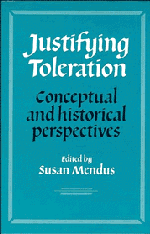Book contents
- Frontmatter
- Contents
- Preface
- Introduction
- 1 Scepticism and toleration in the seventeenth century
- 2 A more tolerant Hobbes?
- 3 Locke: toleration and the rationality of persecution
- 4 Toleration and Mill's liberty of thought and discussion
- 5 Rousseau and respect for others
- 6 The intolerable
- 7 Autonomy, toleration, and the harm principle
- 8 Friendship, truth, and politics: Hannah Arendt and toleration
- 9 Dissent, toleration, and civil rights in communism
- 10 Liberalism, marxism, and tolerance
- 11 Socialism and toleration
- Index
6 - The intolerable
Published online by Cambridge University Press: 20 May 2010
- Frontmatter
- Contents
- Preface
- Introduction
- 1 Scepticism and toleration in the seventeenth century
- 2 A more tolerant Hobbes?
- 3 Locke: toleration and the rationality of persecution
- 4 Toleration and Mill's liberty of thought and discussion
- 5 Rousseau and respect for others
- 6 The intolerable
- 7 Autonomy, toleration, and the harm principle
- 8 Friendship, truth, and politics: Hannah Arendt and toleration
- 9 Dissent, toleration, and civil rights in communism
- 10 Liberalism, marxism, and tolerance
- 11 Socialism and toleration
- Index
Summary
The papers in this book were originally written for a conference meeting under the auspices of the C. & J. B. Morrell Trust, which has encouraged the study of toleration. The aim of the Trust has no doubt been to promote the practice of toleration, and it is natural and right that nearly all of the studies supported by the Trust should be designed to serve that end. Nevertheless we ought to remember that the virtue of toleration, like any virtue, has its limits. There are circumstances in which intolerance is right, either in the weaker sense of being morally permissible or in the stronger sense of being morally obligatory. Take the example of the toleration of religion, the issue which gave rise to the first sustained discussion of toleration in Western political thought. We would all nowadays go further than Locke in advocating toleration of religious beliefs and practices that do not conform to established or majority patterns in our country; yet we would not think it right to include a religion which practised human sacrifice. An understanding of the virtue of toleration can be clarified by trying to mark its limits, by asking when it ceases to be a virtue and becomes a weakness or even a vice.
Mr Peter Nicholson has made a couple of valuable suggestions in a recent paper. The subject of his paper is ‘Toleration as a Moral Ideal’, and after giving a positive account of his views on that topic he ends up with some remarks about the limits which the ideal imposes.
- Type
- Chapter
- Information
- Justifying TolerationConceptual and Historical Perspectives, pp. 137 - 154Publisher: Cambridge University PressPrint publication year: 1988
- 34
- Cited by



